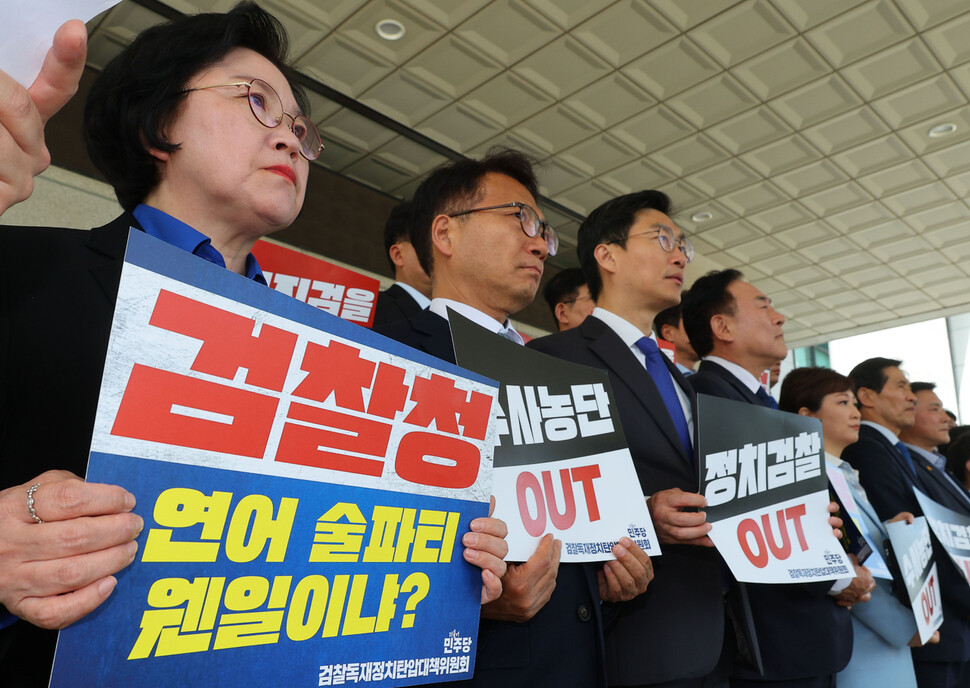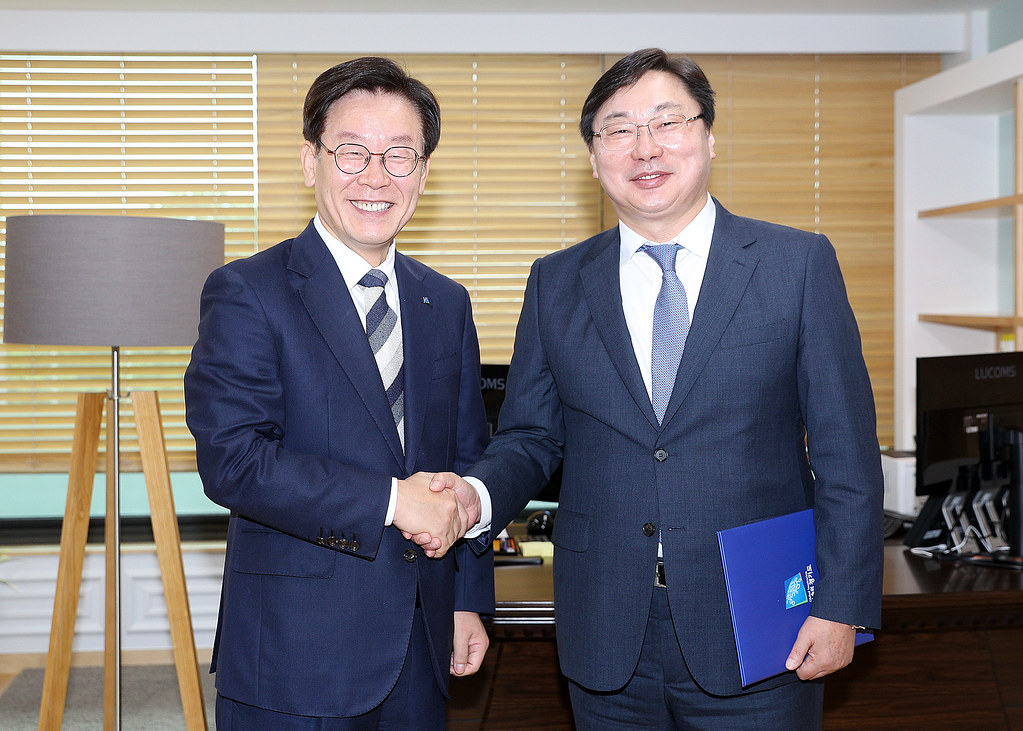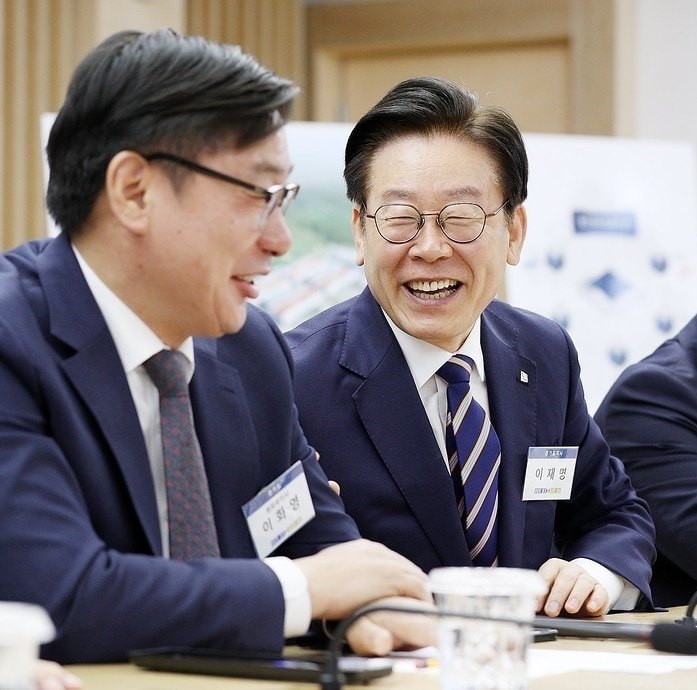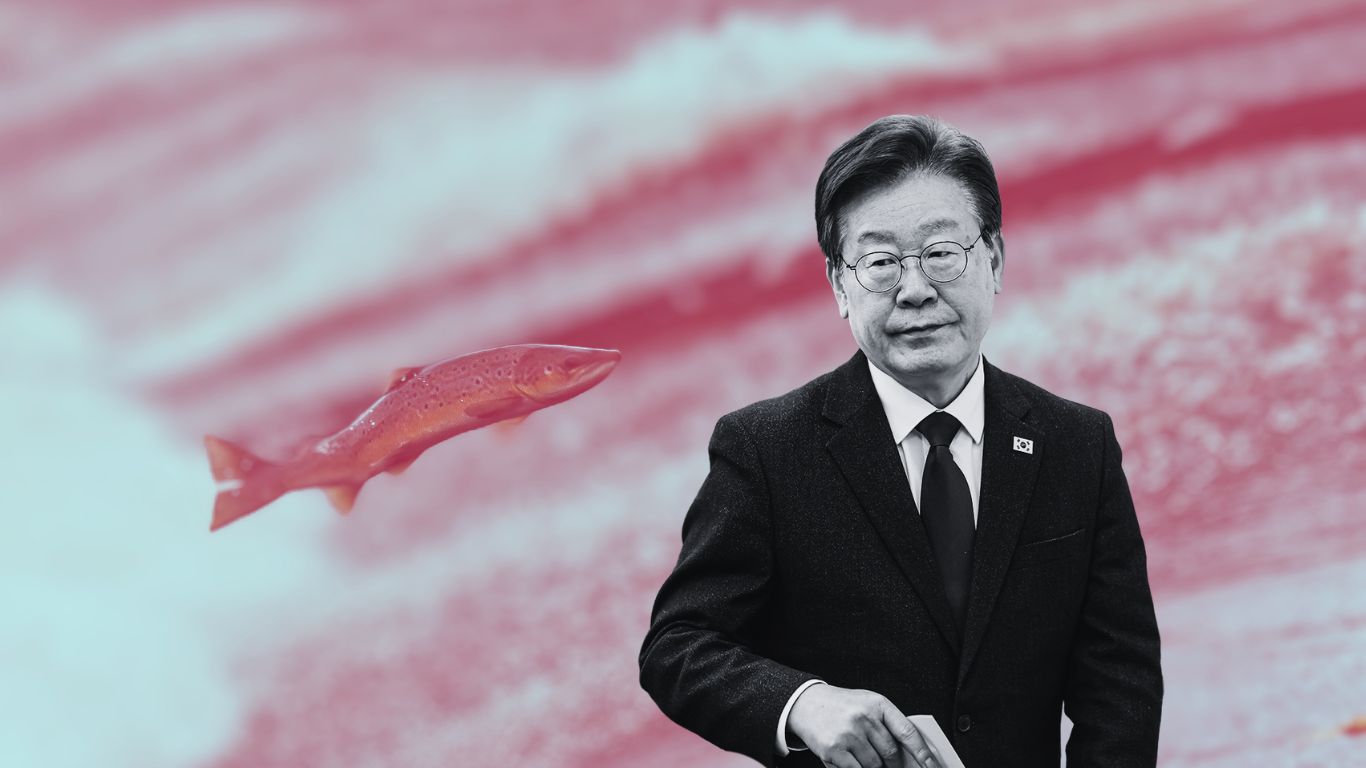Will the salmon set Lee free?
At the forefront of Lee Jae-myung’s struggle for his political survival stand salmon.
Yes, salmon.
Minjoo politicians, including the Minjoo Party leader himself, claims that prosecutors suborned a key witness with booze and salmon to frame Lee.

<figcaption class="wp-element-caption">Minjoo blames the prosecutors for the alleged ‘salmon booze party’</figcaption>Lee Hwa-young이화영, the former Gyeonggi vice governor for peace—a Minjoo newspeak for engaging with North Korea—under Lee’s governorship, testified last year that Lee knew that a former gangster sent $8 million to North Korea on his behalf.
Now he says he was forced by the prosecutors to lie about Lee.
With the salmon.
While the court case in question is about the former vice governor, his testimony, which he now tries to recant, poses a serious threat to Lee’s uphill legal battles. Lee has to have had been kept in the dark in order to minimize the legal damage to him.
Recanting his testimony means, however, that Lee Hwa-young himself would have to take full responsibility of sending cash to Pyongyang, a felony for which the prosecution is demanding 15 years in prison.
That doesn’t sound like the best option for him.
Neither he thought so. That’s why he testified in the first place.
Then, however, his lawyers were dismissed out of the blue.
 <figcaption class="wp-element-caption">Lee appointed Lee Hwa-young, at right, as his vice governor for peace in 2018</figcaption>The salmon booze party theory emerged soon after he hired a new lawyer to represent him. The idea of prosecutors bribing their subject with alcohols and salmon sushi inside an interrogation room is already pretty wild, but he kept revising the details of his revelation, including when and where the party took place and even whether he himself drank, as the prosecution rebutted it with official records.
<figcaption class="wp-element-caption">Lee appointed Lee Hwa-young, at right, as his vice governor for peace in 2018</figcaption>The salmon booze party theory emerged soon after he hired a new lawyer to represent him. The idea of prosecutors bribing their subject with alcohols and salmon sushi inside an interrogation room is already pretty wild, but he kept revising the details of his revelation, including when and where the party took place and even whether he himself drank, as the prosecution rebutted it with official records.
It appears Lee Hwa-young had wanted to keep his former strategy with his former lawyers, reducing the sentence by admitting Lee Jae-myung’s involvement.
But his wife, who fired her husband’s lawyers on his behalf, got in the way. When her husband, apparently bewildered by the sudden dismissal of the lawyers, told the judge that he want them back, she yelled at him from the courtroom gallery to “get your act together.”
The wife later hired a Minjoo provincial lawmaker, incumbent, as her husband’s lawyer. According to the prosecution, several Minjoo national lawmakers were in contact with her after her husband’s testimony that could put Lee in danger.
No salmon were involved this time.
Since then, anyway, the wife and the lawyer have been making frequent appearances on the media, especially on Minjoo Tucker Carlson’s show, defending Lee.
Not her husband.

‘Democracy’ knocking on judiciary’s door
I often find myself in the shoes of third world strongmen criticizing United States’ hypocrisy on democracy when I hear Minjoo talking about democratization of something.
Don’t blame me. There’s a track record: look at what happened after its prosecutorial reform. The term has long been an excuse for paralyzing the justice system to get away with their crimes.
Just like the United States back in the day, Minjoo’s appetite for democracy is so strong that there’s still room for democratization in the justice system as they see. Cho Kuk wants to let people elect prosecutors’ leadership. (This might be actually a good idea, but there are ample reasons to suspect his motives.)
On top of that, now some Minjoo politicians suggest “democratization” of the judiciary in public.
 Kim Dong-a, who made an eyebrow-raising comeback in a primary reversal, remarked right after his election that the judiciary needs a “democratic control” in an interview with (guess the outlet).
Kim Dong-a, who made an eyebrow-raising comeback in a primary reversal, remarked right after his election that the judiciary needs a “democratic control” in an interview with (guess the outlet).
Why? Because a judge made Lee attend a hearing a day before the election. They sing in chorus that the judge is biased, but what they failed to mention is that Lee was often criticized for deliberately delaying his trials.
The judiciary indeed needs reforms. For example, the court rulings should be more open to public (it is very hard—and often impossible—to find one on the database). There has to be a way to prevent former senior judges and prosecutors from earning favors in their clients’ cases by their connections—so-called 전관예우前官禮遇.
But is that what they intend to do?
Min Hee-jin, or the archetype of Korean psyche
When things are going well, everything looks good. But as soon as they are no more, everything starts falling apart. That’s what’s happening in Hybe right now.
K-pop stocks have been slumping these days:
So I wasn’t too surprised when I first heard about the alleged mutiny of Min Hee-jin민희진, the reverend mother of the k-pop supernova NewJeans, although the alleged plan appeared too sloppy to be successful.
Her initial response to the allegations raised by Hybe addressed nothing about them, just blaming Hybe for ripping off NewJeans in the debut of its latest girl group.
She’s not going to survive this, I was quite sure. She said in her response she wouldn’t do such a stupid thing after what happened to Fifty Fifty. But this could end up worse than that.
Her explanation was too inadequate to win back public support. Almost everyone I saw was blaming her.
Her press conference on Thursday was so sloppy from the start that I couldn’t believe it was organized by an entertainment company that, in less than three years, reported last year’s revenue of more than $87 million. Overwhelmed by a torrent of camera flashes, Ms Min looked so helpless.
It’s a goner. Nothing to expect more. I closed the window and got back to work.
Only to find out later that the presser turned the public sentiment inside out. I had to watch it again in the midnight to find out what I missed.
I was astounded by the sheer intensity of her pathos. I’ve been always skeptical about the concept of han, but if han really exists, Ms Min’s presser is a manifestation of it at its purest.
There’s little logical rebuttal of the allegations. Instead, she invites the audience into her furnace of han. In telling us why she is so upset with Hybe, she shows no distinct sense of a public self as the chief executive of a company. There is no partition dividing the public and the private.
So was her affection to her “babies” of NewJeans she displayed throughout the presser. I always thought the naming of the group itself was so cringe (should I say k-ringe?): her viewing the girls as the “new” incarnations of Min Hee-“jean” was so obvious.
Turns out her affection was much stronger than I had imagined. There is no sense of separation between private individuals as we’re supposed to exercise as modern men: they are my babies, and that Hybe “fuckers” are going to hurt my girls.
Even in saying this, Ms Min does not come as her public self. Just like a mother telling her daughter what her husband did to her last night, she breaks into tears, and then starts rambling as suddenly as her bursting began.
The public wouldn’t have been moved if her revelation hadn’t been so shocking. According to her revelations in the conference, a lot of decisions inside Hybe were based on playing favorites rather than rational choices—sometimes even when it’s going to be detrimental to its own business.
Which is not so surprising after you’ve seen what happens in Korean startups when they get big. There is a certain point in business’s growth when family-like affection ceases to be enough in running it. You’ve got to set up institutions and principles, setting personal relationship aside. That’s when most of them hit a wall. (Kakao would be a model case of study.)
As soon as people meet, one becomes hyung, unnie, or sunbae, based on seniority and backgrounds. All relationships are simply an extension of familial bonds, and there is no sense of public relationship: what you do in a community is expected to be unconditional, just like what families do.
One could say this is where han comes from. Or the shamanistic trait that defies the distinction between you and I.
Or simply the lack of modernization.
Ms Min’s original sin would be that she apparently didn’t consulted her lawyers when she signed the contract with Hybe. Such naivety would also be a good example of pre-modern thinking.

